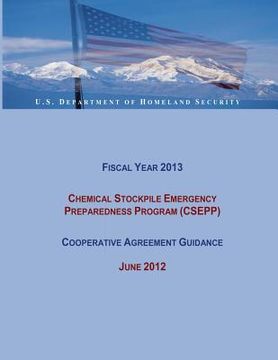Fiscal Year 2013 Chemical Stockpile Emergency Preparedness Program (CSEPP) Cooperative Agreement Guidance (June 2012)
Synopsis "Fiscal Year 2013 Chemical Stockpile Emergency Preparedness Program (CSEPP) Cooperative Agreement Guidance (June 2012)"
In 1985, Congress directed the Department of Defense (DoD) to dispose of its lethal unitary (pre-mixed) chemical agents and munitions while providing "maximum protection for the environment, the general public, and the personnel involved." In 1987, the U.S. Army (Army) released a draft Emergency Response Concept Plan (ERCP), which presented a basis for the development of local emergency response programs and examined various methods of emergency planning. The Army also prepared a Chemical Stockpile Disposal Implementation Plan and requested funds to implement enhanced emergency preparedness on-post and off-post for all eight chemical stockpile sites. FEMA joined the Army in implementing CSEPP through a Memorandum of Understanding (MOU) signed in August 1988. This MOU was reaffirmed in 1993 and revised in 1997 and 2004. CSEPP is a project conducted under the chemical demilitarization program, a major defense acquisition program executed by the U.S. Army. CSEPP augments the Army's installation chemical accident and incident response capability. The Army is responsible for programming and budgeting validated CSEPP requirements as developed by the State and local governments and validated by FEMA. The Deputy Assistant Secretary of the Army for Eliminating Chemical Weapons (DASA [ECW]) is responsible for overseeing the CSEPP execution, to include coordination with Congress, FEMA, and the Citizen Advisory Commissions. The Chemical Materials Agency executes the day-to-day management of CSEPP, to include upgrading on-post response capabilities; developing on-post preparedness plans; conducting on-post training; automation; and integrating on- and off-post capabilities. FEMA is responsible for off-post emergency preparedness and works with the States and local governments in the development of preparedness plans, conducting necessary training, administering cooperative agreements, and upgrading response capabilities. Off-post efforts include command and control, public awareness of protective actions, communication, and alert notification systems (e.g., computer hardware and software, telephone and radio upgrades, sirens, and tone alert radios). FEMA assists the States and local governments in planning and validating their CSEPP requirements and distributes funds to the States under cooperative agreements. The States and local governments execute plans to protect the public and provide financial and performance reports, addressing the capability improvements realized through those funds. While the likelihood of a chemical stockpile incident with off-post consequences is considered remote, the Army and FEMA recognize that the impact of such an event could be significant. CSEPP Strategic Plan states the basic goal of CSEPP is "to mitigate the effects of an accident to the maximum extent practicable." Thus, CSEPP has two basic objectives: 1. To establish and enhance emergency preparedness in nearby communities, including community alert and warning systems and protective action strategies. 2. To institute protective measures and hazard mitigation strategies at the chemical stockpile sites (the Army installations) to lessen the vulnerability of the storage structures and their contents to any internally or externally generated accidents.

